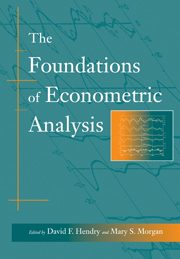Book contents
- Frontmatter
- Contents
- Preface
- Acknowledgements
- Introduction
- Bibliography
- I The Emerging Role of Econometrics in Economics
- 1 The Scope and Method of Political Economy (Macmillan, London, 1891, pp. 313–14, 320–31)
- 2 Business Cycles (California University Memoirs, vol. III, Berkeley, 1913, pp. 19–20, 449–51)
- 3 Economic Cycles – Their Law and Cause (Macmillan, New York, 1914, pp. 66–8, 84–8 (cut))
- 4 An Essay on the Nature and Significance of Economic Science (Macmillan, London, 1932, pp. 98–105)
- 5 The Common Sense of Econometrics (Econometrica, vol. 1, 1933, pp. 5–12)
- II Early Time-Series Analysis
- III Applied Econometrics and the Identification Problem
- IV The Evolution of Statistical Thinking in Econometrics
- V Dynamic Models
- VI The Tinbergen Debate
- VII Structure and Simultaneity
- VIII The Probabilistic Revolution
- IX Exogeneity
- Index
3 - Economic Cycles – Their Law and Cause (Macmillan, New York, 1914, pp. 66–8, 84–8 (cut))
Published online by Cambridge University Press: 05 June 2012
- Frontmatter
- Contents
- Preface
- Acknowledgements
- Introduction
- Bibliography
- I The Emerging Role of Econometrics in Economics
- 1 The Scope and Method of Political Economy (Macmillan, London, 1891, pp. 313–14, 320–31)
- 2 Business Cycles (California University Memoirs, vol. III, Berkeley, 1913, pp. 19–20, 449–51)
- 3 Economic Cycles – Their Law and Cause (Macmillan, New York, 1914, pp. 66–8, 84–8 (cut))
- 4 An Essay on the Nature and Significance of Economic Science (Macmillan, London, 1932, pp. 98–105)
- 5 The Common Sense of Econometrics (Econometrica, vol. 1, 1933, pp. 5–12)
- II Early Time-Series Analysis
- III Applied Econometrics and the Identification Problem
- IV The Evolution of Statistical Thinking in Econometrics
- V Dynamic Models
- VI The Tinbergen Debate
- VII Structure and Simultaneity
- VIII The Probabilistic Revolution
- IX Exogeneity
- Index
Summary
‘The Law of Demand’
Statistical Laws of Demand
Two fundamental defects in the current theoretical method of treating economic 66 questions are exemplified in the case of the theory of demand: first, the assumption is made that all other things being equal (the old cœteris paribus), an increase in the supply of the commodity will lead to a corresponding fall in the price; secondly, it is assumed that the concrete problem of the relation of price and supply of commodity will be simplified by attacking first the constituent elements of the question rather than by attacking directly the problem in its full concreteness. Neither assumption is satisfactory nor indeed admissible. The ‘other things’ that are supposed to remain equal are seldom mentioned and are never completely enumerated; and consequently the assumption that, other unmentioned and unenumerated factors remaining constant, the law of demand will be of a certain type, is really tantamount to saying that under conditions which are unanalysed and unknown, the law of demand will take the supposed definite form. The burden of proof is upon anyone using this method to show that the assumption does not at least involve a physical impossibility.
The second of the above two assumptions is not more satisfactory than the first. It reproduces the defects of the first assumption with others superadded.
- Type
- Chapter
- Information
- The Foundations of Econometric Analysis , pp. 95 - 97Publisher: Cambridge University PressPrint publication year: 1995



